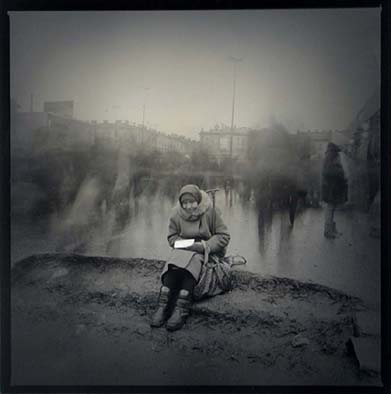 "I'll keep in touch," they say, you say. But as with all metaphors, it's a porous and ineffable boundary that separates what's in and what's out of touch. Perhaps it creeps up on you after a while, perhaps you catch note of it while it's happening, seemingly unstoppable like a glacier slowly falling towards the sea: you've lost touch, you're losing touch, you may even be losing your touch.
"I'll keep in touch," they say, you say. But as with all metaphors, it's a porous and ineffable boundary that separates what's in and what's out of touch. Perhaps it creeps up on you after a while, perhaps you catch note of it while it's happening, seemingly unstoppable like a glacier slowly falling towards the sea: you've lost touch, you're losing touch, you may even be losing your touch.I'll phone tomorrow; I'll send that email tonight; you promise yourself. But the first deferral makes the second easier, and so progressively until you no longer remember what you might have said, what you might have written.
In part it may be because now there are so many more ways to keep in touch: letter, phone, email, instant message.
You can look up addresses and phone numbers with lightning speed: the other day I was naively shocked by how easy it was to locate people at WhitePages.com, and even more by how much more information (and for only $39.95) US Search could offer me.
Plugging in my own name, I saw US Search had details of 22 former addresses. Had I really moved so much? I wondered. And so the feeling with which that left me was more a sense of being irrevocably out of touch, now with my own life, with all that I had managed to forget even about myself.
It's like the strange shock of looking at old photos, seeing yourself among a smiling group of people, and realizing you have no idea who these others are: people who obviously meant so much, so intensely, at one point, but who have now drifted irredeemably out of your memory.
There's something brutal, then, about technology's power of memorialization and recall, when set alongside our own dwindling capabilities to keep in touch with the many now nameless individuals who at one point touched you, whom you at one point touched.
And with all the power we now have to remedy these deficits, increasingly we allow it to fall into disuse. When was the last time I sent or received a letter? Or did much with email beyond barely trying to keep abreast of my inbox?
Perhaps we teachers are (if we allow ourselves to be) especially susceptible to this sudden shock of realizing how much we have lost touch. The other day I stumbled across a sheaf of essays that students had forgotten to pick up a couple of semesters ago. Looking over the names of my former students, while some images suddenly flashed back into view, I realized how many names I could no longer put a face to, how many of their personalities and characteristics had been obliterated in my attempt to learn the names of ever new student cohorts each semester.
But somewhere here is simply the same old, same old vertigo of modernity: the experience of rapid change, even during one lifetime, the sense that expanded social circles and social mobility casts its shadow in transience and oblivion.
And no wonder paranoia becomes our age's defining neurosis, generating on the one hand the conpiratorial theses that suggest everything is connected, and on the other hand the worry that if I have lost touch it's somehow their fault. But at least if they're all after me, then they're thinking about me after all.

Crossposted at Act 13. Touch.
No comments:
Post a Comment